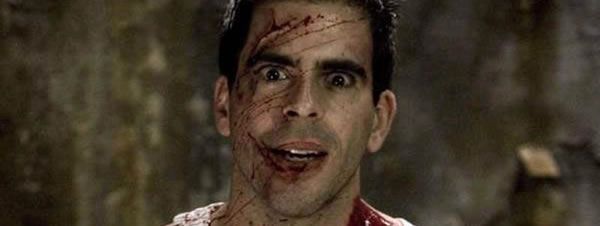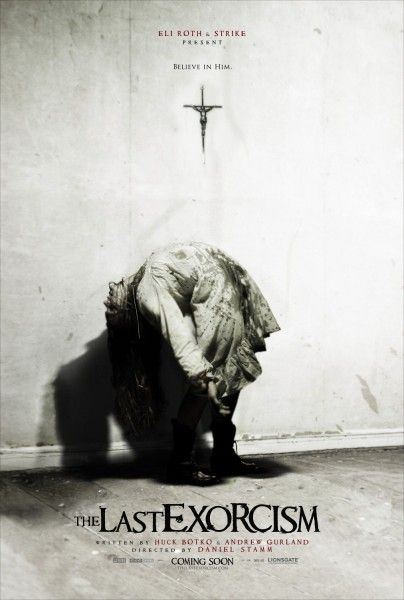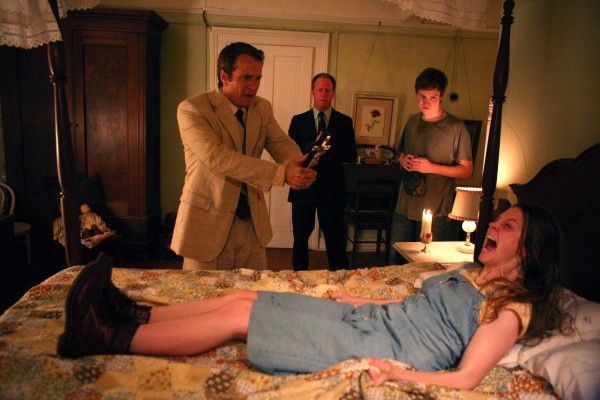In talking to filmmaker Eli Roth, one thing becomes immediately clear, he is equally passionate and knowledge about his chosen career path, which presumably accounts for his huge success in the film industry.
As the man behind Cabin Fever and Hostel (along with its sequel Hostel II), he proved that you can make films with a modest budget and no major stars that audiences will love. Now the producer of the documentary-style thriller The Last Exorcism, which he is bringing to the big screen with German filmmaker Daniel Stamm at the helm, he is focusing much more on psychological horror than gore, which is no less effective in its creepiness factor.
While promoting the film at the press day, Eli Roth talked to Collider about what drew him to this script, why he sees film as the perfect outlet to release your life’s fears and his desire to make a 3D feature. He also gave us updates on Man with the Iron First (which he expects to go into production in the Fall), The Other Woman (which he’s producing), Endangered Species (which he plans to direct) and a remake of Funhouse (which he plans to do in 3D). Check out what he had to say after the jump:
Question: Since you’ve said you always wanted to be involved with an exorcism movie, what was it about this one that was different and fresh and made you want to produce it?
Eli: Obviously, I loved The Exorcist. It traumatized me as a child, and I’ve always been fascinated by possession, but it is the most iconic horror film of all time. That and Jaws are the two biggest movies. I always thought, “How can you make a movie scarier?” And then, I read the script and I thought, “My God, you can’t make a movie scarier than The Exorcist, but you can tell a great original story and just tell the best story possible.”
I thought the script was such a smart take on it because the characters are aware. The characters in The Last Exorcism have all seen The Exorcist. But, doing it from the point of view of the reverend who is making this movie as a confessional was so smart. Because we know he’s confessing, it allows us to enjoy the tricks he’s playing on people and we know that, eventually, we’re laughing at the humiliation he would ultimately suffer. The script just kept changing until ultimately you realize it’s this film about faith and belief, and what happens if you don’t believe. I never knew where the script was going. Every time I thought I had it figured out, there was a new twist. It kept me really guessing, right up until the end.
I just thought it was one of the best, smartest, scariest scripts I’d read. And, it really made me think about the vampire genre. What started with Dracula, today is True Blood, Twilight and The Vampire Diaries, and they all co-exist. And, think of all the zombie movies that have come out, even since the rebirth of the modern zombie genre. People love the subject. They can’t get enough of it. So, I feel that possession is so relevant today, in society, and exorcism is something that still terrifies and fascinates people, and it was time to tell a different story in that space.
Having responded so strongly to the script, did you give any thought about directing it yourself, or did you always know that you wanted to find somebody to do it?
Eli: Originally, the writers Huck Botko and Andrew Gurland were attached to direct the script, and they were always attached, and I loved their film Mail Order Wife. I thought it was a great, sick, dark, black comedy, which people should definitely seek out. But then, we lost them at the last second because their movie The Virginity Hit got greenlit, just as we were about to start. I was in Berlin working on Inglourious Basterds and thought, “I could step in as the director, but I don’t want to. I want to produce and make my name as a producer. This is the test, if I really am a producer or not. If I’m a producer, I should be able to really find a better director for the project, who is someone that will bring something that I never saw before.”
I saw Daniel Stamm’s film Unnecessary Death, which my producing partners had seen, and I was just blown away. And, after speaking with him, we knew he was the guy. Watching the movie know, you can’t imagine anyone else directing the film. I just thought he elevated what was already a great script to just a whole other level.
So many people prefer to deny their fears and what scares them, but you seem to fully embrace that and make movies about it. Why do you think you’re so easily able to identify with that and translate it to make it accessible to audiences?
Eli: I think that many people are ashamed when they feel afraid. There’s this thing in our society that you’re not allowed to feel scared. You have to be a man and put on a brave face, but we all have fears. It’s not just fears of monsters attacking us, but fears of dying alone, never meeting or falling in love with the right person, or wondering if the person you’re with is the person you think you’re with. There’s the fear of losing your job and the fear of losing your health. There’s fear in everything, but we can’t just succumb to that. We have to suppress it, so we get used to suppressing fear to make it through the our day. Otherwise, we’d become paralyzed by them.
But, you do need an outlet to release all of those fears. You build it up and then, when you go to a movie theater, it’s the last place that it’s socially acceptable to be terrified. It’s saying that, for the next 90 minutes, you’re allowed to be afraid and you’re not a coward for feeling that way. In fact, it’s encouraged to feel that way. Let’s all feel that way together, in a group. You’re probably on a date with someone squeezing your hand, and you scream and let it out and it feels good, and afterwards you’re energized. It’s actually a cathartic experience.
My favorite horror movies, you can really tell that the subject matter is very personal to the director. Horror is like comedy. Woody Allen’s comedy is going to be very different from Ben Stiller’s comedy which is going to be different from Adam Sandler’s comedy which is going to be different from Judd Apatow’s comedy. They’re all comedy, but they’re all very different types and you can enjoy all of them. Horror is the same way. John Carpenter’s horror is different from David Cronenberg’s horror which is different from Sam Raimi’s horror, and those are the guys I responded to because they were writing about their own personal obsessions. Anything that I’ve ever been involved in, I always would only do it if it was something very personal to me.
Steve at Collider wants to know, as a fellow New Englander, what you would do to get a Dunkin’ Donuts to open in California?
Eli: Oh, dude, I would be a spokesperson for Dunkies. Instead of being Mr. Fitness, I’d be Mr. Fatness, if they opened a Dunkin’ Donuts out here. We spent our childhoods there. In high school, if you had a 15-minute break, you ran over to Dunkies. Much of my youth was spent in the parking lot or inside a Dunkin’ Donuts.
What is the status of Man with the Iron Fist?
Eli: That’s something we’re putting together and looking to shoot in late Fall in China. We’re actually location scouting in September.
Are you also producing The Other Woman?
Eli: Yeah. We’re still working on the script. Everything has been put on hold to get The Last Exorcism released.
What makes you decide whether you’re going to produce something, write it or direct it, since you do them all?
Eli: Well, for directing, it has to be something that I’ve written or an idea where I feel like I have to be the one to tell the story. But sometimes, you collaborate on an idea with a friend, and it’s a filmmaker that you really like, and you go, “I’d love to see their version of this story.” Whether it’s something you’ve created or they created, it’s a film that you want to see. This is where I am today and tomorrow it could certainly change, but I feel like, if I’m going to spend a year and a half on something, I want it to be something that I’ve written, or if I’m going to adapt it, that I wrote the screenplay or co-wrote it.
Do you know when you’re going to get behind the camera again?
Eli: Hopefully, as soon as possible. All I’m thinking about is getting The Last Exorcism into theaters, and then I go and do the publicity in Europe. Once that’s over, I just need to finish my script for Endangered Species, and then get behind the camera.
With 3D taking off in such a big way, has that affected how you’re approaching anything that you’re working on? Are you thinking about that as you write stuff?
Eli: I’ve always been a fan of 3D, going back to movies in the ‘50s. I was part of the early ‘80s 3D craze, which was coming at you in Jaws 3D, so I’ve always wanted to make a 3D film. But, I think it’s one of those things, like with CG and fake blood. It’s another ingredient to tell a story, but it’s not for every story. I don’t think The Last Exorcism would have been a better film in 3D, but we’re doing a remake of Funhouse in 3D, specifically to write gags that go great in 3D.
I would love to do a 3D film. I’ve seen the new technology and how good it is. We’ve been to the 3D houses and seen how you used to get a headache, but you don’t get that headache anymore because they can do this weird mix on the visuals and your eye isn’t adjusting as much, so you just don’t get dizzy watching it. It’s very exciting. Back in the day, you would shoot a film and cut it, and they wouldn’t really know what the effect was until they were editing the film for dramatic effect, but that would often give you a headache because of the close-up to wide shot. Now that technology has been able to take care of the headache problem, so it’s very exciting.
It seems like the movie business is going through a big change right now, with so many smaller companies going under and the economic recession. Does that affect you, as a filmmaker?
Eli: Of course, but I’ve always produced my own films. Going back to Cabin Fever, I was involved in creating the budget, raising the money, taking it to a marketplace and selling it. Even with The Last Exorcism, even though Studio Canal cash flowed it, we financed the movie by pre-sales. I went to the market in Berlin and in Cannes, and I met with foreign buyers and sold the territory based on my name and my commitment to do press in that country. Then, they’ll buy it for a certain amount, and the financing is pieced together that way. So, because I take an active part, in the business sense, I’m very aware and conscious of that when I’m making a film.
I also know that, as technology has gotten easier for everyone to make movies, and you can buy a camera for $10,000 and shoot it and it looks amazing, what’s happened is that it’s harder to get your movie in theaters. So, there are going to be a glut of films that get made that are independent, but really only the best of those films or the ones that are most worthy, are the ones that will get released theatrically because there are so few companies.
That’s why a film like The Last Exorcism is successful. You can say, “Okay, here’s a film that does not have major stars, that is not a sequel, that is not a remake, that is in a genre and people came out to support it.” That makes it easier for other distributors to buy similar movies. So, there’s hope. It’s just up to the filmmakers to make good movies. If you make a great movie, the audience will find it. Make movies for audiences though. These self-indulgent, $18 million art films are dead, and many of them deserve to die.



